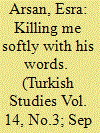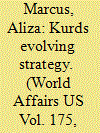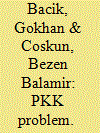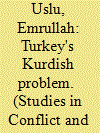| Srl | Item |
| 1 |
ID:
045806


|
|
|
|
|
| Publication |
London, Ithaca press, 1981.
|
| Description |
377p.hbk
|
| Standard Number |
0903729776
|
|
|
|
|
|
|
|
|
|
|
|
Copies: C:1/I:0,R:0,Q:0
Circulation
| Accession# | Call# | Current Location | Status | Policy | Location |
| 025634 | 956.7043/JAW 025634 | Main | On Shelf | General | |
|
|
|
|
| 2 |
ID:
123425


|
|
|
|
|
| Publication |
2013.
|
| Summary/Abstract |
Turkey is a country where democratization process has been repeatedly interrupted by military interventions in the past 50 years. Censorship and self-censorship have become ordinary practices in the media, mainly due to weak parliamentary representations followed by oppressive coup periods. Yet even though a democratically elected government is currently in charge of the country, censorship of the press remains to be a common and systematic to silence alternative views. It is also claimed that self-censorship is widespread within the press. A report published by Freedom House in 2010 argues that while Turkish officials continue to enforce strict laws, journalists are frequently jailed for discussing issues such as the Kurdish problem, the military or political Islam. The government that is led by the Justice and Development Party (Adalet ve Kalkinma Partisi) is continuing to crack down on unfavorable press coverage. This article presents the findings of a survey titled "Censorship and Self-Censorship in Turkey, 2011." The participants of the study were Turkish journalists and the questions revolved around their personal experiences with regards to censorship and self-censorship. Their answers reveal why Turkish media seldom makes news for public interest.
|
|
|
|
|
|
|
|
|
|
|
|
|
|
|
|
| 3 |
ID:
116681


|
|
|
|
|
| Publication |
2012.
|
| Summary/Abstract |
This study investigated the link between press and democratic consolidation in Turkey. It was assumed that plural structures in the sense of diversity of the news, approaches, responses, and ideological positions would be contributive to democratic consolidation. Accordingly, this article searched the patterns of diversity and plurality among the print media news between the years of 1984 and 2008. The article proved that the Turkish press responded in a plural manner to the selected case.
|
|
|
|
|
|
|
|
|
|
|
|
|
|
|
|
| 4 |
ID:
157017


|
|
|
|
|
| Publication |
New Delhi, KW Publishers Pvt Ltd, 2018.
|
| Description |
xvi, 298p.hbk
|
| Standard Number |
9789386288868
|
|
|
|
|
|
|
|
|
|
|
|
Copies: C:1/I:0,R:0,Q:0
Circulation
| Accession# | Call# | Current Location | Status | Policy | Location |
| 059266 | 956.6/RIA 059266 | Main | On Shelf | General | |
|
|
|
|
| 5 |
ID:
118886


|
|
|
| 6 |
ID:
106610


|
|
|
|
|
| Publication |
2011.
|
| Summary/Abstract |
This article discusses why Turkey has failed to propose an effective political solution of the Kurdish problem. It is argued that Turkey's failure to propose an effective political agenda is the main explanation of why Partiya Karkeran Kurdistan (PKK) insurgency has been rampant for so long. Turkey's commitment to militaristic methods worsened the Kurdish problem by creating deeper social problems. Furthermore, it is argued that the explanations tendered also point out the important factors that may affect the fate of any political agenda on the Kurdish problem, including that of the recent Kurdish initiative of the Justice and Development Party (AKP) government.
|
|
|
|
|
|
|
|
|
|
|
|
|
|
|
|
| 7 |
ID:
010319


|
|
|
|
|
| Publication |
Spring 1996.
|
| Description |
43-52
|
|
|
|
|
|
|
|
|
|
|
|
|
|
|
|
| 8 |
ID:
077077


|
|
|
|
|
| Publication |
2007.
|
| Summary/Abstract |
On October 3, 2005, Turkey's longstanding Kurdish problem potentially entered a new phase when the European Union formally initiated accession negotiations with Turkey. Although this process promises to be long and arduous, it also represents a watershed opportunity for the solution of Turkey's Kurdish problem. The Copenhagen Criteria required for EU membership mandate the stability of institutions guaranteeing democracy, the rule of law, human rights and protection of minority rights. There is no bargaining on these criteria. Turkey is required to accept them for entry into the EU. For all Turkish citizens (ethnic Turks and ethnic Kurds alike) who want to fulfill Mustafa Kemal Ataturk's ultimate goal of achieving contemporary civilization4, EU membership for Turkey would be a win/win situation because it would guarantee truly democratic Kurdish rights within the confines of Turkey's territorial integrity.
Turkey's EU candidacy would also help put the lie to the clash-of-civilizations thesis5 of inevitable war and even Armageddon between the Christian West and Islamic East. As a member of the EU, Turkey would offer the Muslim world an attractive moderate model of cooperation and prosperity with the West that would benefit all. In addition, young, hardworking Turkish immigrants will help solve Europe's population problem of a zero growth rate not being sufficient to support the EU's welfare states. Furthermore, Turkey's geostrategic access to the gas and oil supplies of the Middle East and Central Asia will make Turkey invaluable for the EU's future energy needs as well as providing alternative energy routes to Europe.
|
|
|
|
|
|
|
|
|
|
|
|
|
|
|
|
| 9 |
ID:
076664


|
|
|